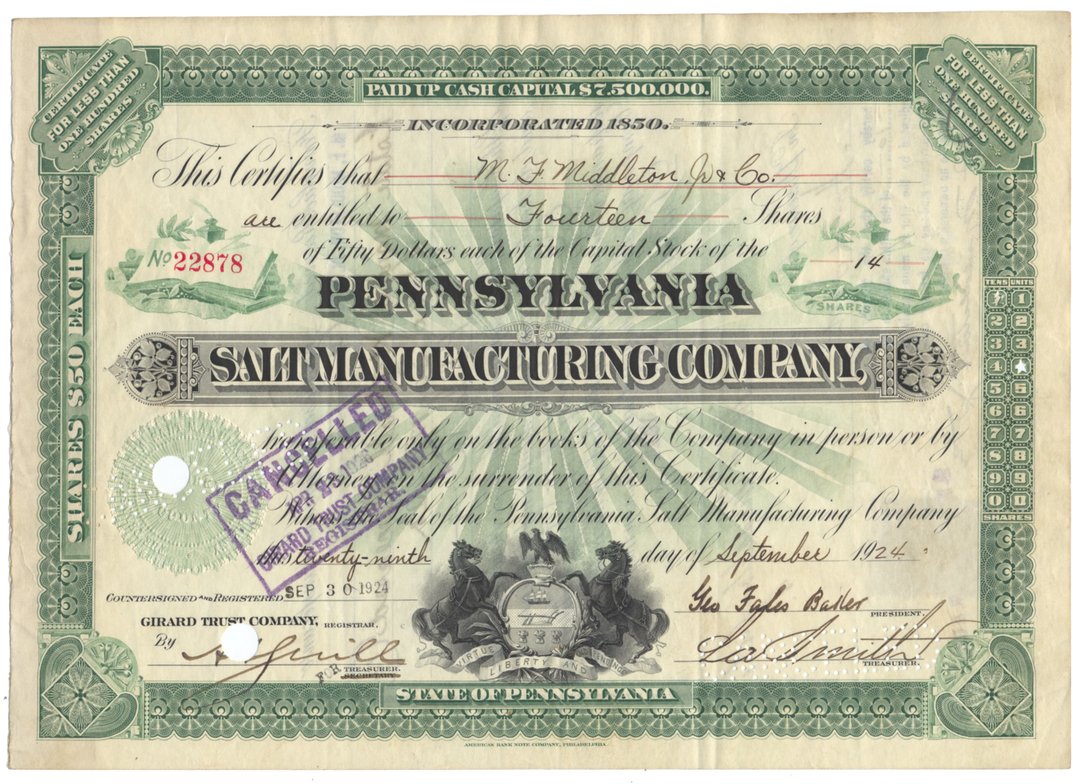
Pennsylvania Salt Manufacturing Company
- Only 1 available!!
- Backordered, shipping soon
- Guaranteed authentic document
- Orders over $35 ship FREE to U. S. addresses
Product Details



Pennsylvania Salt Manufacturing Company
Certificate Type
Capital Stock
Date Issued
1920's and 1930's
Canceled
Yes
Printer
American Bank Note Company
Signatures
Hand signed
Approximate Size
10 3/4" (w) by 7 1/2" (h)
Additional Details
NA
Historical Context
Five young Quakers started the Pennsylvania Salt Manufacturing Company in 1850 with a small budget and a great deal of hope. They combined their conservative outlook with some calculated risks and that early philosophy has been the trademark of this diversified chemical corporation ever since.
The two primary founders of Pennsylvania Salt, George T. Lewis, a commission merchant, and Charles Lannig, a manufacturer, combined their resources with three other Philadelphia Quakers to begin the process of producing alkalies from salt. At the start of this venture the partners had in their favor $100,000 in capital, a plant located on a salt deposit near Pittsburgh, and a patent for the process. The future looked promising, but after five years of attempting to manufacture salt and its derivatives, the group despaired of making the company a success. Although operating expenses were draining the company's resources, the partners decided to give the company one final try. That gamble paid off, and the company soon made a name for itself.
The first success of the company was not in salt production however. Around 1856 the company started selling lye soap for household use, and the idea was an instant success. In 1856 the company reported its first profitable year. Due to the success of the soap manufacturing business, Pennsylvania Salt Manufacturing was able to finance the restructuring of its salt processing system.
The Pennsylvania Salt Manufacturing Company is notable for many innovations within the industry. In 1865 the company had begun to use some of its other raw materials, specifically, cryolite, which is a natural fluoride of sodium and aluminum that was used at the time as a whitener in the production of glass and ceramic ware. It became an important addition to the company product line. In 1864 the company signed a contract with the Danish government to obtain cryolite from the only known site in Greenland. The company was also the first to ship liquid chlorine (1907) and anhydrous hydrofluorine acid for the use in high-octane aviation fuel (1931) by tank car.
During World War II the company signed a contract with the U.S. government to manufacture synthetic cryolite. This government contract was primarily responsible for increasing the company's earnings from $9.5 million in 1939 to $26 million in 1944. In addition, unlike many companies of this time, Pennsylvania Salt did not have to reconvert its products for war time usage.
After the war the company implemented a progressive policy of research and development which led to an increased use of raw materials that diversified the essentially one-product business. By 1945 the company was manufacturing a wide range of chemicals for use within the aluminum, glass and ceramic industries, and the chemical manufacturing and farm operations industries, including such items as chlorine and chlorine compounds, acids, disinfectants, germicides and insecticides, soap and bleaching compounds, and weed killers.
The company policy of adding new products, developing new processes and expanding its facilities was established to solidify its earning potential in the years after the war. By 1950 Pennsylvania Salt was experiencing a faster rate of growth than before the war. In addition, Pennsylvania Salt could boast that it had plants located throughout the United States, including the east, midwest, south and northwest.
In 1950 Pennsylvania Salt celebrated its 100th anniversary; it was one of the oldest companies in the chemical business. It had established a reputation for being one of the "soundest firms" in the industry, with a "conservative" and "well-heeled" image. This solid reputation is exemplified by the company's report to its shareholders in 1978 that its credit rating was one of the best in the industry, and that it was a company that paid cash for everything it purchased. In 1947 Pennsylvania Salt called on its shareholders to support a share issue plan for a $7.5 million facility expansion program. This was the first time that the company had ever issued preferred stock shares, and this move symbolized a new direction for the firm.
Leonard T. Beale was president during this time and is credited for establishing new priorities for the company, not only through financing schemes, but also in terms of diversification. Beale was elected president in 1928 and continued in that post until 1949 when he was appointed chairman. Beale's management strategy included diversifying the company by acquiring dairy sanitation specialty lines, a laundry and dry cleaning compound manufacturing firm, and a chlorate plant in Portland, Oregon.
Beale's diversification policy was continued by William P. Drake who was appointed chief executive officer in 1955. Drake was interested in moving the company away from the commodity cycles that harmed its earnings and into specialty chemicals. Under Drake's direction the company diversified even further into equipment manufacturing lines, and he also emphasized new product research. Within a ten year period sales doubled to $144.4 million in 1964.
The company name was changed in 1957 to Pennsalt Chemical Corporation.
Related Collections
Additional Information
Certificates carry no value on any of today's financial indexes and no transfer of ownership is implied. All items offered are collectible in nature only. So, you can frame them, but you can't cash them in!
All of our pieces are original - we do not sell reproductions. If you ever find out that one of our pieces is not authentic, you may return it for a full refund of the purchase price and any associated shipping charges.



